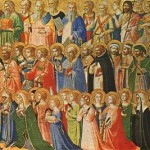As you’ve probably heard, Pope Francis gave a broad ranging interview to America this week, and if everyone is going to pick out quotations (with or without context) I figured I could offer seven that interested me this week (with brief, non-authoritative commentary).
Other people have covered the lovely simplicity of Pope Francis’s self description [excerpted below] but I was just charmed at the multilingual pope needed to reach for an invented gerund to express himself fully:
“Yes, but the best summary, the one that comes more from the inside and I feel most true is this: I am a sinner whom the Lord has looked upon.” And he repeats: “I am one who is looked upon by the Lord. I always felt my motto, Miserando atque Eligendo [By Having Mercy and by Choosing Him], was very true for me.”
The motto is taken from the Homilies of Bede the Venerable, who writes in his comments on the Gospel story of the calling of Matthew: “Jesus saw a publican, and since he looked at him with feelings of love and chose him, he said to him, ‘Follow me.’” The pope adds: “I think the Latin gerund miserando is impossible to translate in both Italian and Spanish. I like to translate it with another gerund that does not exist: misericordiando[“mercy-ing”].
There was an interesting theme of invention as expression throughout the interview. I was kind of reminded of the idea from Plato that teachers don’t instruct, they simply help the student remember some true thing they weren’t aware of. In the process of coaxing something out from a roomful of students, a teacher might still be surprised by the framing any student uses to express a shared truth.
“St. Vincent of Lerins makes a comparison between the biological development of man and the transmission from one era to another of the deposit of faith, which grows and is strengthened with time. Here, human self-understanding changes with time and so also human consciousness deepens. Let us think of when slavery was accepted or the death penalty was allowed without any problem. So we grow in the understanding of the truth. Exegetes and theologians help the church to mature in her own judgment. Even the other sciences and their development help the church in its growth in understanding. There are ecclesiastical rules and precepts that were once effective, but now they have lost value or meaning. The view of the church’s teaching as a monolith to defend without nuance or different understandings is wrong.
“After all, in every age of history, humans try to understand and express themselves better. So human beings in time change the way they perceive themselves. It’s one thing for a man who expresses himself by carving the ‘Winged Victory of Samothrace,’ yet another for Caravaggio, Chagall and yet another still for Dalí. Even the forms for expressing truth can be multiform, and this is indeed necessary for the transmission of the Gospel in its timeless meaning.”
And as for when art and philosophy go off the rails…
“When does a formulation of thought cease to be valid? When it loses sight of the human or even when it is afraid of the human or deluded about itself. The deceived thought can be depicted as Ulysses encountering the song of the Siren, or as Tannhäuser in an orgy surrounded by satyrs and bacchantes, or as Parsifal, in the second act of Wagner’s opera, in the palace of Klingsor. The thinking of the church must recover genius and better understand how human beings understand themselves today, in order to develop and deepen the church’s teaching.”
Which reminded me (tonally anyway, no guarantee Pope Francis agrees with Hannah) of this exclamation from Arcadia:
The whole Romantic sham, Bernard! It’s what happened to the Enlightenment, isn’t it? A century of intellectual rigor turned in on itself. A mind in chaos suspected of genius.
The part of the interview where I felt the least recognition was here:
The image of the church I like is that of the holy, faithful people of God. This is the definition I often use, and then there is that image from the Second Vatican Council’s ‘Dogmatic Constitution on the Church’ (No. 12). Belonging to a people has a strong theological value. In the history of salvation, God has saved a people. There is no full identity without belonging to a people. No one is saved alone, as an isolated individual, but God attracts us looking at the complex web of relationships that take place in the human community. God enters into this dynamic, this participation in the web of human relationships.
I haven’t experienced the Church very much as a people. I came to Catholicism more through books and philosophical sparring. And, although I was working on developing ties to my parish and to the Dominican House of Studies in DC, my somewhat peripatetic existence in California has made Catholicism feel a lot more like something I do alone.
The Pope did speak of his own need for community in which to experience communion (he cites it as the reason he entered the Jesuits, instead of becoming a diocesan priest). But he values his particular community as much for its ability to disorient as to comfort.
“The Society of Jesus is an institution in tension,” the pope replied, “always fundamentally in tension. A Jesuit is a person who is not centered in himself. The Society itself also looks to a center outside itself; its center is Christ and his church. So if the Society centers itself in Christ and the church, it has two fundamental points of reference for its balance and for being able to live on the margins, on the frontier. If it looks too much in upon itself, it puts itself at the center as a very solid, very well ‘armed’ structure, but then it runs the risk of feeling safe and self-sufficient. The Society must always have before itself the Deus semper maior, the always-greater God, and the pursuit of the ever greater glory of God, the church as true bride of Christ our Lord, Christ the king who conquers us and to whom we offer our whole person and all our hard work, even if we are clay pots, inadequate. This tension takes us out of ourselves continuously. The tool that makes the Society of Jesus not centered in itself, really strong, is, then, the account of conscience, which is at the same time paternal and fraternal, because it helps the Society to fulfill its mission better.”
I was actually discussing Yudkowsky’s “Twelve Virtues of Rationality” with a friend who was a bit baffled by the nameless twelfth virtue. I gave my best guess that, since rationality is a developing art, there should always be a sense of having missed something, and joy in filling in any part of that lacuna, but never complacency and despair.
Growing toward God seems to require a similar spirit. We are always insufficient, but discovering a specific instance of our own frailty shouldn’t be repugnant. Noticing helps us offer that part of ourselves, too, and to pray for the grace to pluck out the beams we haven’t spotted yet.
The incompleteness of our understanding and our actions forces us to engage in reflection and interpretation, if only to keep what we already know alive and growing in us.
But it is difficult to speak of the Society,” continues Pope Francis. “When you express too much, you run the risk of being misunderstood. The Society of Jesus can be described only in narrative form. Only in narrative form do you discern, not in a philosophical or theological explanation, which allows you rather to discuss. The style of the Society is not shaped by discussion, but by discernment, which of course presupposes discussion as part of the process. The mystical dimension of discernment never defines its edges and does not complete the thought. The Jesuit must be a person whose thought is incomplete, in the sense of open-ended thinking.
Also, there’s an entire fascinating section where Pope Francis cites specific examples of art that moves him and adds:
“Anyway, in general I love tragic artists, especially classical ones. There is a nice definition that Cervantes puts on the lips of the bachelor Carrasco to praise the story of Don Quixote: ‘Children have it in their hands, young people read it, adults understand it, the elderly praise it.’ For me this can be a good definition of the classics.”
It sounds like the way he means us to experience the Gospels as well.
For more Quick Takes, visit Conversion Diary!













